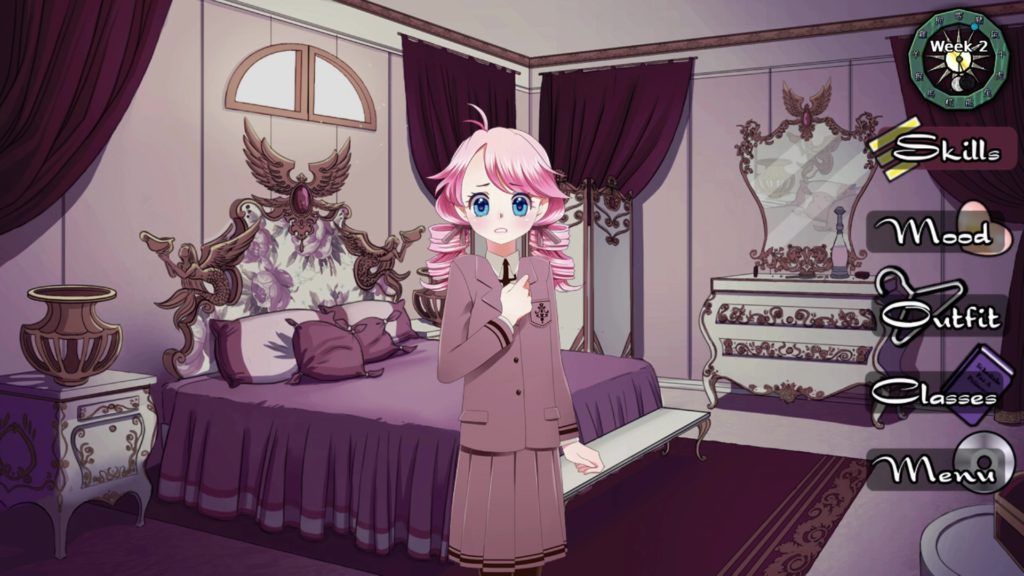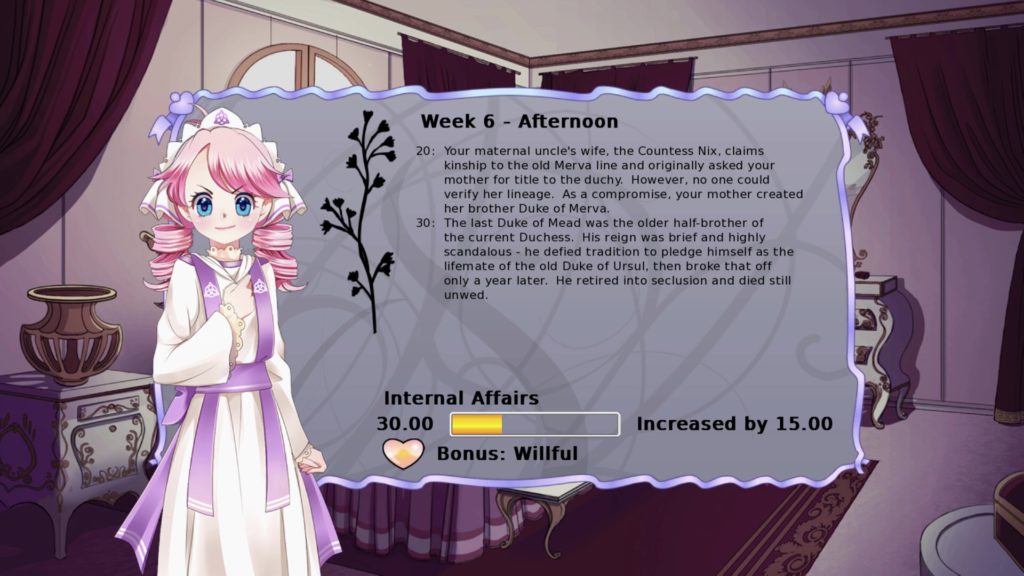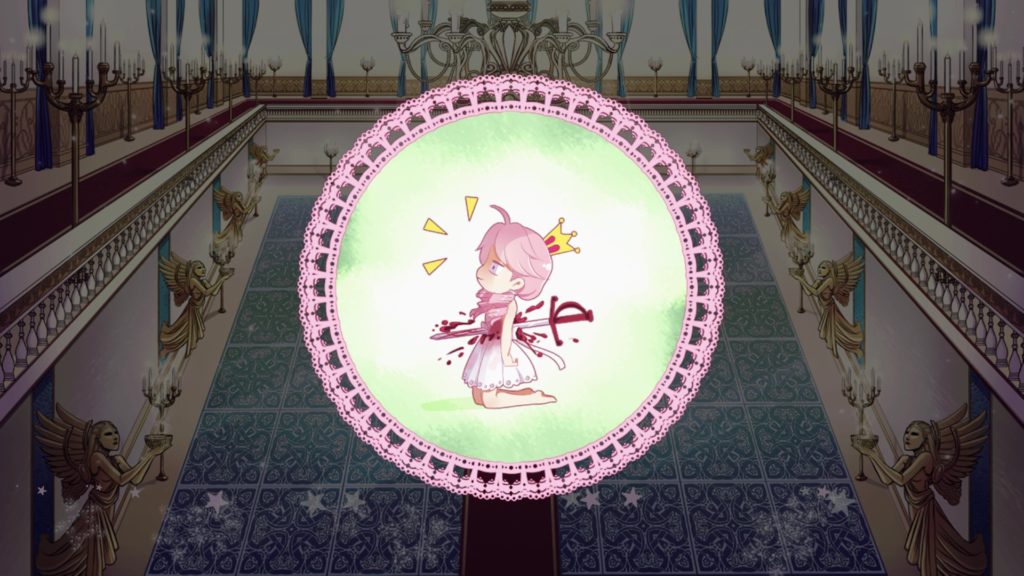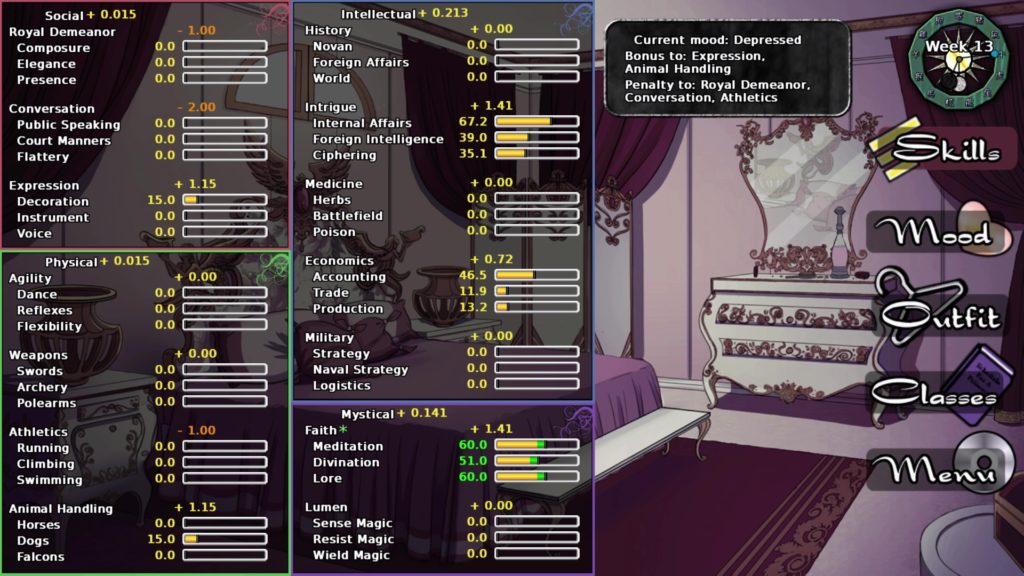Prepare to die (again) in Long Live the Queen
Most video games, particularly in the anime-adjacent space, are set up with the assumption that we’re going to succeed at them if we put enough time into them. It’s pretty rare we come across something that celebrates or encourages failure — though it’s always interesting when we do. And such is the case with Long Live the Queen, a well-regarded title from Hanako Games that first hit the scene for PC back in 2013, and which has just had a series of recent console ports via the prolific Ratalaika Games.
Long Live the Queen is the work of Georgina Bensley, also known as Hanako Games. She’s put out a number of excellent games on PC over the years, particularly in the early 2010s. Her work tends to strike a good balance between the exaggerated nature of anime-style media and some more down-to-earth considerations; besides Long Live the Queen, her Magical Diary series of dungeon-crawling dating and wizarding sims is particularly noteworthy, and if you enjoy what you see here, well worth checking out.

But I digress. Long Live the Queen places you in the role of Elodie, the crown princess of Caloris, who is fast approaching her fifteenth birthday and her coronation. She is woefully unprepared for the job ahead of her, so it’s up to you to guide her studies in such a way that she is able to deal with the various situations she encounters on the path to successful rulership.
There are many, many different paths down which you can direct the story — and, it has to be said, most of them end in tragedy of some sort. So be aware of that going in; you are going to fail at Long Live the Queen, and the sooner you accept that, the better.
Gameplay in Long Live the Queen unfolds in a Princess Maker style, where each in-game week you’re given the opportunity to select what Elodie is to study in both the mornings and the afternoons. According to your selections, she will gain skills in various areas ranging from appropriate queenly behaviour to the intricacies of accounting, and these skills will be tested at various junctures in order to determine what happens next.
Elodie’s skill growth is affected by her mood; negative moods such as depression and anger aren’t necessarily a bad thing, since they provide bonuses to skills that can feed on this particular type of emotional energy — being depressed begets creativity, for example, as a frightening number of us can doubtless attest — but it is often important to manipulate her mood if you’re taking aim for a particular story path.
To that end, each in-game weekend can be spent doing one of various different activities, which generally has an impact on one or more of her overall mood sliders.

Weekend activities can also lead to various narrative routes. For example, early in the game, a relation of Elodie on her mother’s side comes to the castle, and following through her story and events allows Elodie to embrace her “Lumen” heritage and unlock the ability to cast magic. You have to be careful, though, because you may well find that getting to this stage ends up costing Elodie in other areas, leading to a “dead end” that no amount of magic will be able to get you out of.
But what you do in this situation is simply remember what went wrong and try again, perhaps taking a different approach. In my first playthrough, for example, Elodie’s magical studies came at the expense of her courtly behaviour, ending up with her suffering a vote of no confidence and then either ending up dead or married off to a horrible man who took all the power in the kingdom for himself.
Knowing this, I can then return to pursuing this particular path at a later time, knowing that working on skills such as Presence and Composure will be beneficial in the long term.
In many respects, Long Live the Queen can be looked at as a “narrative roguelike”. Each time Elodie falls, you’ll generally have to start again, since even if you’ve been saving like crazy along the way, inevitably at some point you’ll have “locked” yourself into a particular route. But that’s where the joy of this game lies; the more you play it, the more you’ll discover that the overall story can branch off in absolutely myriad paths, many of which are completely unrelated to one another.

And the game encourages you to do so. Not only is there a “death checklist”, encouraging you to find all the possible means for Elodie to meet a sticky end, there’s also a substantial list of achievements that suggest specific happenings that you might want to try and pursue, and a collection of epilogues that show the end result of your efforts to keep Elodie safe and sane. It is not a spoiler to suggest that many of these are what we would traditionally refer to as “bad endings” — but not all of them involve Elodie dying.
To say too much about the specifics of what you might find yourself doing in Long Live the Queen is to spoil the experience, because this is a game all about experimentation and narrative discovery. You might find disparate ways to reach the same narrative content, or you might find yourself heading off in completely different directions. The joy is in discovering that for yourself; in finding new ways to play the game that surprise, delight and, at times, horrify you.
If I may give the prospective player one piece of advice, though: make your first few playthroughs at the very least completely blind, perhaps taking notes along the way. This is not a game where you are supposed to take an “optimal” playthrough the first time through.
Part of the fun is getting into a real mess and seeing if it’s possible to get yourself out of it — and, if not, learning from the experience. If you jump straight to a walkthrough in an attempt to see the “best ending”, you’re kind of missing the point. You’re supposed to fail. You’re supposed to learn from the experience. You’re supposed to explore all the possibilities ahead of you, both good and bad.

Although extremely simple in its presentation and execution — you may find yourself wishing to turn off the extremely short musical loops after a while, for example — Long Live the Queen is considered a modern cult classic with good reason.
It’s cleverly designed, it’s smartly written, and there’s nothing else quite like it out there. It’s a delight to see it make a grand return after nearly 10 years of being confined to PC — and I sincerely hope that at least some of you reading this manage to guide Elodie to something vaguely resembling happiness, because heaven knows I’m still struggling.
Long Live the Queen is available now for PC via Steam, PlayStation platforms, Xbox platforms and Nintendo Switch. Thanks to Derek from PR Hound for the review code.
Join The Discussion
Rice Digital Discord
Rice Digital Twitter
Rice Digital Facebook
Or write us a letter for the Rice Digital Friday Letters Page by clicking here!
Disclosure: Some links in this article may be affiliate links, which means we may earn a small commission if you make a purchase after clicking on them. This is at no additional cost to you and helps support Rice Digital!
- Letter from the Editor: passing the torch - June 30, 2023
- Super Woden GP 2 is looking promising - June 30, 2023
- Inti Creates is making a 32 bit-style Love Live action platformer - June 26, 2023






